Table of Contents
After a hot summer day at work, a day is tiring, and you simply turn on your AC for a breeze of cool air. Now, have you ever wondered where this cool air comes from? Yes. That is your AC compressor. Now, making sure your AC works correctly at all times is important. Therefore, keeping your AC system regularly maintained is important. Whether it’s your AC unit fuse or just keeping it clean inside, you must always check on it. To understand how you can experience that cool breeze, you need to understand how a compressor works. Worry not if you’re confused about how it works and the science behind it. We are here to help. Let us understand this cooling system’s basic workings and functions; whether the AC unit is in our car or at home, a cool breeze is all we need.
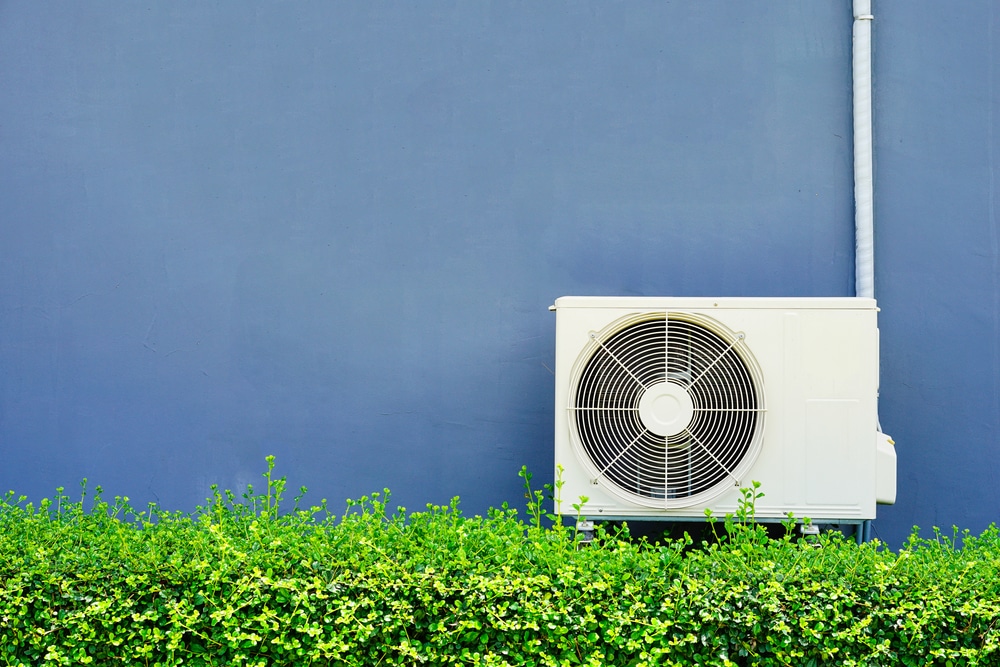
AC Compressor
Have you ever experienced that noise your AC makes sometimes when it’s malfunctioning? That is your AC compressor. Hence, you must inspect your compressor if it’s not working properly. An AC compressor is essential for moving refrigerant, the central component of an HVAC system, or a car’s air conditioning unit. It functions similarly to a heart by compressing gaseous refrigerant before it enters the condenser. The gas is in superheat during this compression, preparing it for the phase shift required for heat transmission. After the refrigerant is in compression, it travels to the condenser, releasing heat and reverts to a liquid to begin the cycle. Air conditioners would not deliver cool air without this essential part. AC compressors are crucial to air conditioning systems and are critical in maintaining ideal refrigerant levels, guaranteeing effective cooling and comfort.
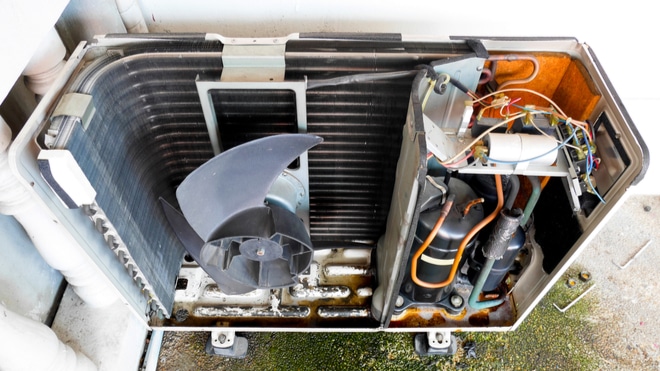
Working of an AC Compressor on an AC Unit
First Phase: Evaporation of Refrigerator Fluid
The refrigerant is supercool liquid before it enters the compressor. As it passes through evaporator coils, heat from the interior air is absorbing, evaporating and cooling the outer air.
Procedure of Compression
When the heated refrigerant gas enters the compressor, it is compressed. The compressor draws in and pressurizes gas by rotating a piston powered by a motor inside a cylinder. This compression process is necessary to superheat the gas because ambient heat is compressed into a smaller region in high-pressure gas.
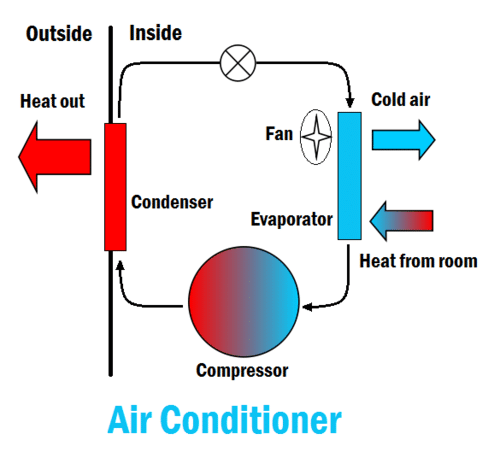
Heat Transmission via the Condenser
After being released under pressure and superheated, the gas travels through the AC condenser’s coils. At this point, the gas inside the AC unit rapidly cools down, condensing back into a liquid state. This quick cooling procedure facilitates effective heat dissipation.
The Refrigeration Cycle Continues
After condensing, the refrigerant liquid is sent back through the air conditioner to begin the refrigeration cycle. Cooling the air in the room is restarted when it returns to the evaporator coils to collect more heat from the interior air.

Importance of Air Conditioning
The proper functioning of an air conditioning system depends on the AC compressor. It guarantees that refrigerant is transformed and circulated correctly, enabling the air conditioner to remove heat from the interior and expel it outdoors, creating chilly air in the room.
Upkeep and Fixing
An air conditioning system’s longevity and effectiveness depend on maintaining ideal refrigerant levels and ensuring the compressor operates properly. If the compressor has problems, including failure or inefficiency, the AC unit may need to be repaired or replaced.
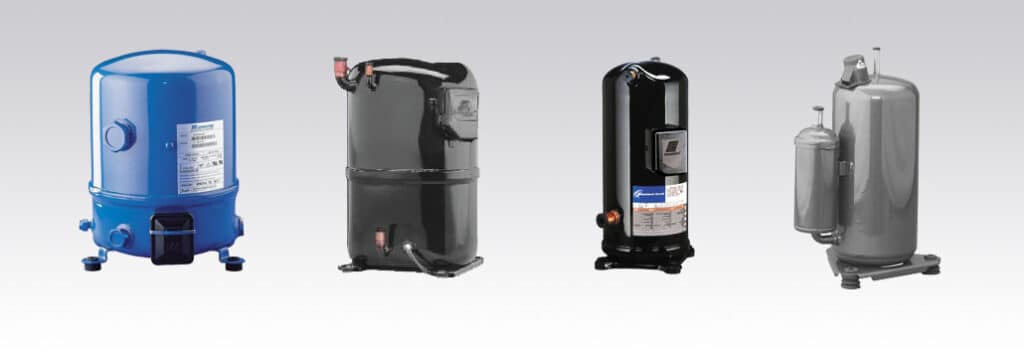
Air Conditioning Compressor: The Types
· Reciprocating AC Compressor
The widely used and industry-standard reciprocating AC compressor functions like a car engine. A motor and crankshaft inside airtight cylinders drive up to eight pistons. By creating vacuums, these pistons pull in gaseous refrigerant and compress it to cause superheating. The refrigerant is released into the condenser unit after it is hot and pressured. This design guarantees effective heat pump compression and transport, which is essential for functioning air conditioning systems.
· Scroll AC Compressor
Because of their dependability and efficiency, scroll AC compressors are becoming increasingly popular. They use a pressurized chamber created by two spiral scrolls rotating against one another, with very little mechanical complexity and few moving parts. As the refrigerant travels toward the center of the scrolls, it becomes trapped and compressed. Performance is improved by the constant rotation, which guarantees a steady supply of compressed refrigerant.
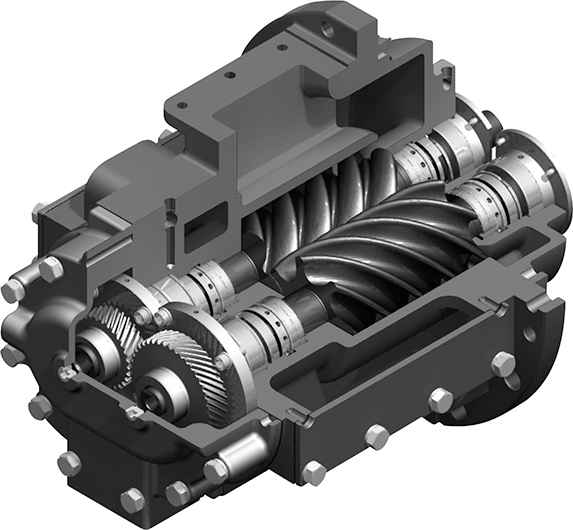
· Screw AC Compressor
Screw compressors are very dependable and efficient equipment that are frequently seen in large commercial buildings. These compressors are too big for smaller homes, unlike their residential equivalents. Two interlocking screws rotate as part of their operating mechanism, sucking refrigerant in and pressurizing it inside the chamber while the rotors spin. This procedure provides a reliable answer for commercial air conditioning needs by guaranteeing efficient cooling for large-scale applications.
· Rotatory Air Conditioning Compressor
Because they move very little and are small, rotary air conditioner compressors are excellent at reducing noise. They have a dynamic chamber created by an offset rolling piston rotating within a more extensive housing. Together with the rolling piston, a sliding vane collects refrigerant. The chamber pulls refrigerant in as the motor rotates, compressing it against a vane before releasing it. This mechanism is perfect for locations sensitive to noise since it guarantees effective cooling while keeping quiet.
· Centrifugal Air Conditioner Compressor
The priciest and most complicated compressors are centrifugal air conditioner compressors, which are usually in large-scale commercial projects. They work by pulling refrigerant into the fast-spinning impeller, which creates a centrifugal force that presses the refrigerant at the edge. This technique effectively raises the pressure of the refrigerant, which is essential to the cooling process. Centrifugal compressors are in applications requiring huge cooling loads, including industrial facilities and large commercial buildings, because of their excellent efficiency and capacity.
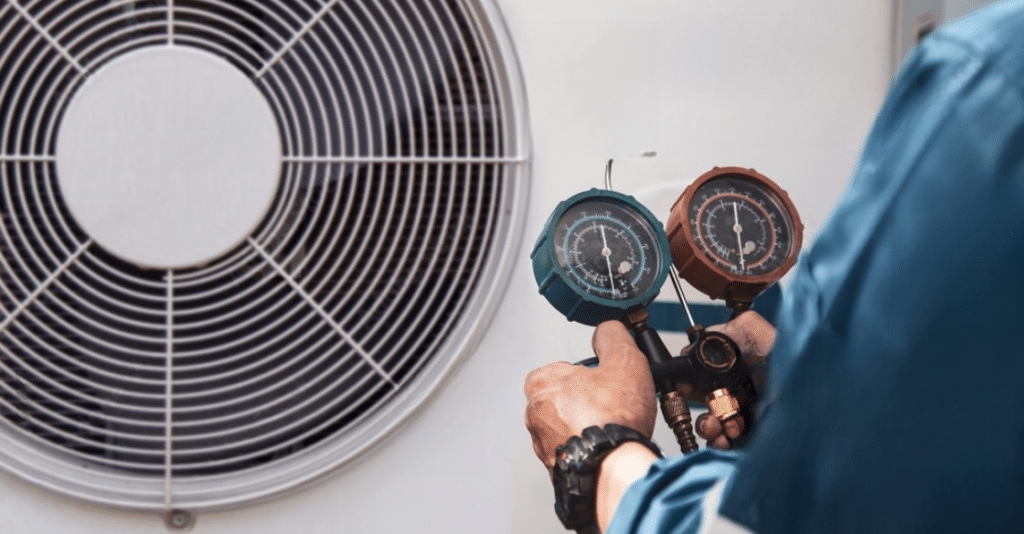
globalheatingairconditioning.com
Maintaining Your Compressor
Like any apparatus with moving components and a motor, regular maintenance is necessary to ensure the optimal operation of your compressor. This means monitoring oil levels and performance regularly to find possible problems early. Compressor inspection, often done as part of regular HVAC maintenance services, enables experts to spot issues and suggest AC compressor repair when needed, guaranteeing the continuous effectiveness of your HVAC system. Compressors can function generally for ten to fifteen years with routine inspections and maintenance, highlighting the significance of routine maintenance. It’s best to plan yearly maintenance of summer heatwaves so that your system is ready for higher demand. Furthermore, maintaining a clean and clear exterior unit devoid of leaves and debris is essential for avoiding obstructions and guaranteeing adequate ventilation, extending your compressor’s lifespan. You can prevent future problems and keep your HVAC system operating efficiently for many years by being proactive and obtaining professional help when necessary.
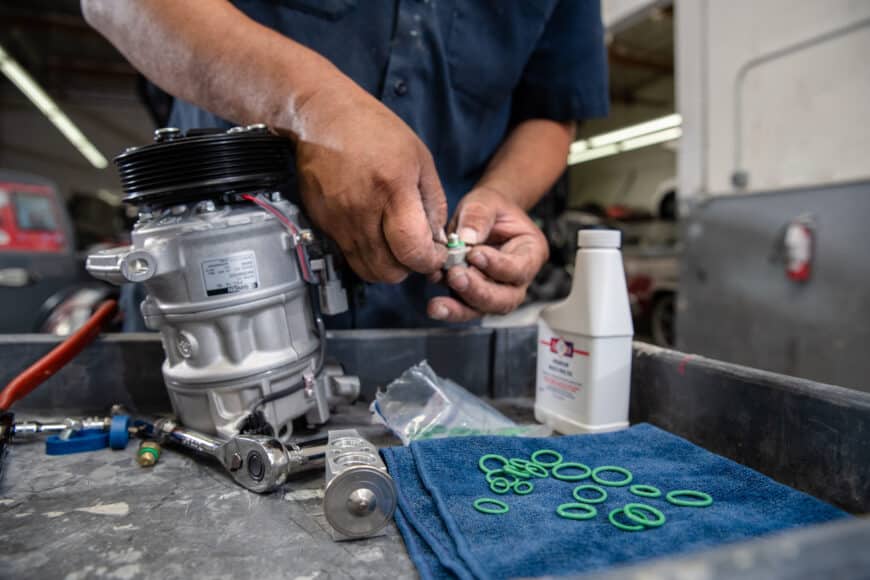
Final Thoughts
Hence, the A/C compressor is a crucial part of air conditioning systems, functioning as the heart. Its importance cannot be emphasized since it is in charge of moving refrigerant and making it easier for warm air to become chilly. The compressor clutch, which absorbs heat and ensures that cool air flows smoothly throughout the room, is a crucial component of air conditioning systems in homes or cars. Maintaining this essential organ at peak performance requires routine care, which includes checking refrigerant levels and quickly correcting any wear and tear. Knowledge about an AC compressor’s operation benefits homeowners and HVAC specialists by increasing the system’s longevity and efficiency.
In conclusion, exploring the world of air conditioning compressors reveals the secret to keeping a calm and pleasant environment, whether replacing the compressor or understanding its complex operations.
